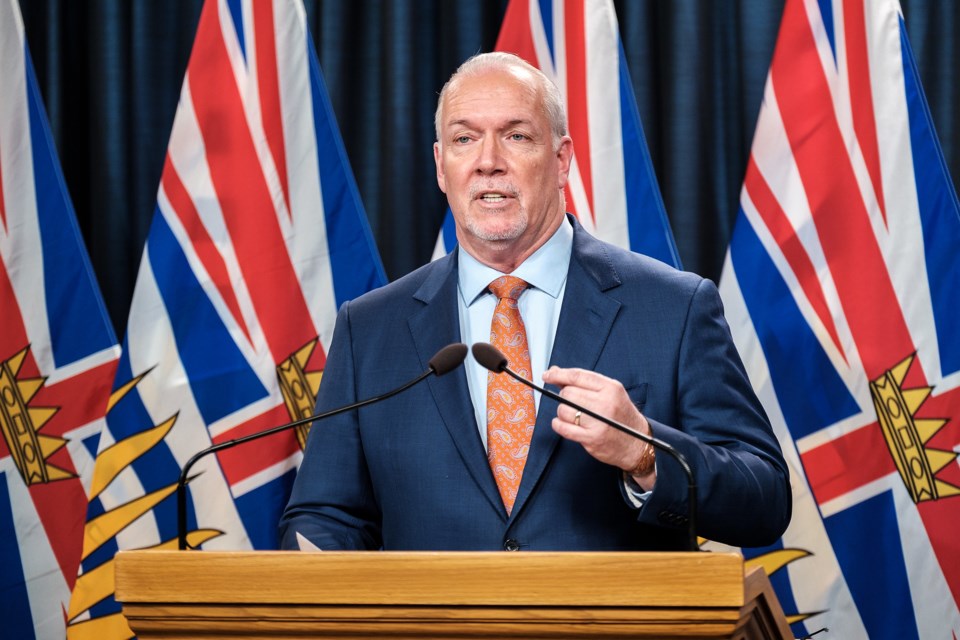There were obvious signs yesterday’s COVID-19 briefing was going to hurt. It was moved ahead two hours. Premier John Horgan was joining. And people in the restaurant and service industry had been tipped: bad news incoming.
The news was indeed bad – a new record daily high for positive COVID-19 cases, a continued increase in more-infectious variant cases, and tightened restrictions for pubs and restaurants (no indoor service for three weeks) and houses of worship (no Easter, Passover, or Vaisakhi gatherings for a second consecutive year).
Normally, that’s what we’d be talking about. But that’s not what dominated discussion.
For months, Dr. Bonnie Henry and Health Minister Adrian Dix were the public face of the pandemic. Each briefing followed the same basic format, a well-established formula that earned international acclaim last summer – but if we’re being honest, that was its peak, and has since grown stale. As others have noticed and Horgan admitted today, the every-couple-of-days briefings have long stopped being appointment viewing. Many media outlets stopped taking them live.
That’s not a criticism of Dix or Dr. Henry, who have done admirable jobs. But success depends on the message reaching everyone, and the numbers say it hasn’t been successful for quite some time.
People have tuned out. We can debate why all day long, but I suspect it’s probably a collection of reasons. Here are four off the top:
- Simple fatigue.
- Tone deaf public health messaging, from glory holes all the way down to blanket fort bingo.
- Complacency from a stubbornly persistent notion that Canada would always handle the pandemic better than the US, and BC better than Canada.
- The perception that the end was just around the corner, from Horgan saying he was confident BC was on the right track less than two weeks ago, to Dr. Bonnie Henry publishing a book about the pandemic – which increasingly feels like a book about the Super Bowl written at halftime.
There are almost certainly more factors, but that’s another column, and the point remains the same: with numbers well into “uh oh” territory, something had to change.
Enter Premier John Horgan.
“I am appealing to all British Columbians to not blow this,” said Horgan today, “there must be something you can do as home that is enjoyable as going somewhere else.”
One can only assume the Premier has something better than drinking tea and making blanket forts in mind. And it’s more than a little galling to be told restrictions were being relaxed because things were getting better – and then less than two weeks later, to be blamed and even judged for acting like things were getting better.
But as tone deaf as this comment was – wacky, even – it probably wouldn’t have triggered a firestorm. But blaming the kids? That triggered a firestorm.
"The cohort from 20 to 39 are … quite frankly, putting the rest of us in a challenging position,” said Horgan.
“Do not blow this for the rest of us.”
It’s hard to think of a less productive message, aside from hypothetically (and wrongly) blaming a particular ethnic group.
It’s easy and lazy to blame “partiers,” but this age cohort is most likely to be on the front lines of everything from hospitals to food delivery, most likely to have taken a severe financial hit, and most likely to have had to make tough decisions about kids in schools.
It’s also the demographic last in line for vaccines.
And, as CBC’s Justin McElroy and his ubiquitous charts illustrate, the rate among 20 to 40 year-olds over the past few weeks is up just a single percentage point from the first year of the pandemic. The numbers simply don’t bear out what Horgan said.
But even if millennials were to blame – just hypothetically, take your finger off the tweet button – what good would it do to say so? With no shortage of signs that people’s tempers and patience are dangerously frayed, fingering a villain seems irresponsible.
Public health messaging had to change – but this was a step in the wrong direction.
Maclean Kay is Editor-in-Chief of The Orca
SWIM ON:
- Maclean Kay last wrote that FOI issues keep bedeviling governments – and having made transparency a key issue, the NDP really should know better.
- Gaby Wickstrom: Don't nag (and presumably, don't blame millennials) but instead, show what "doing better" looks like.
- In February, Rob Shaw advocated burning that stupid COVID self-care BINGO card.



